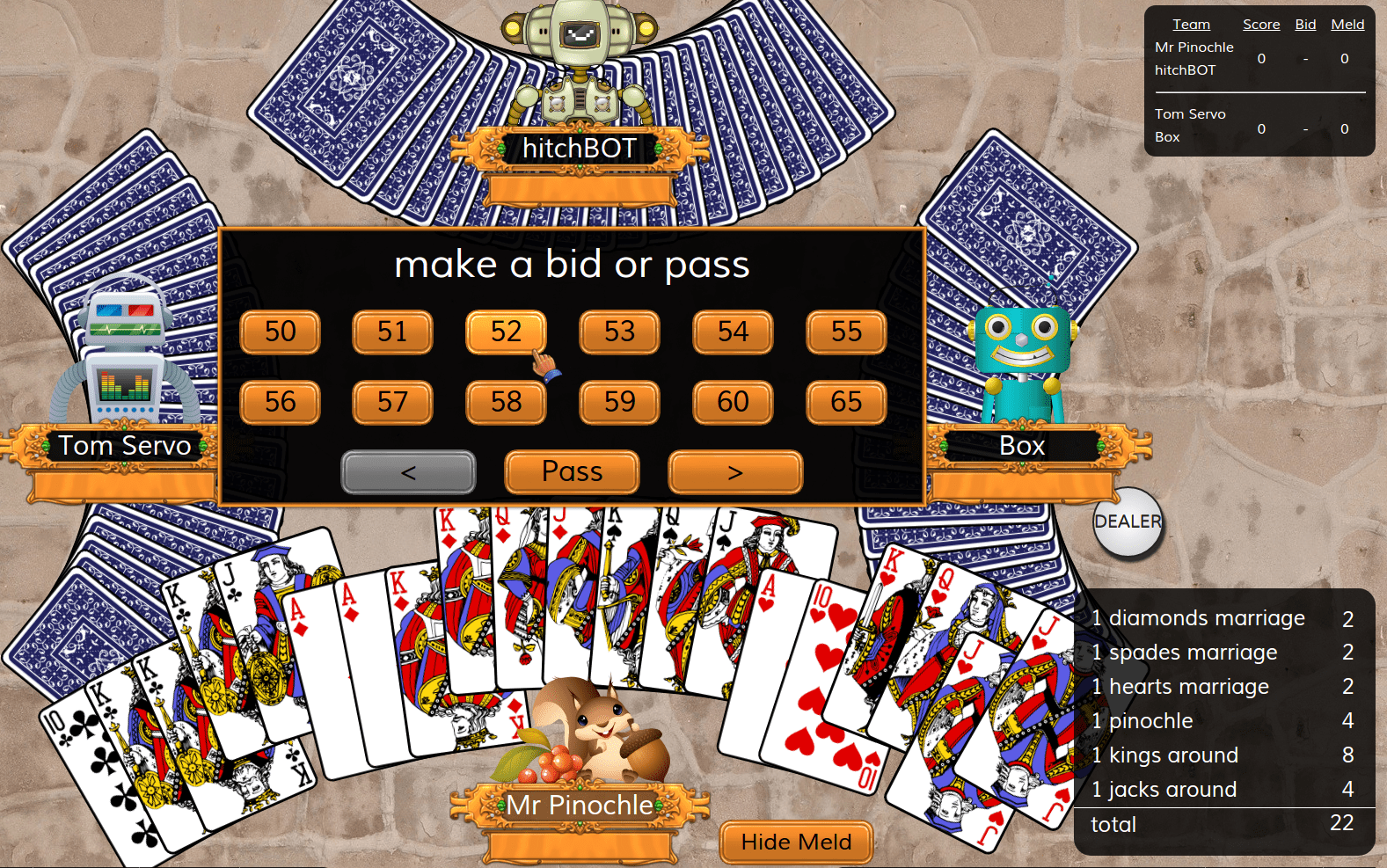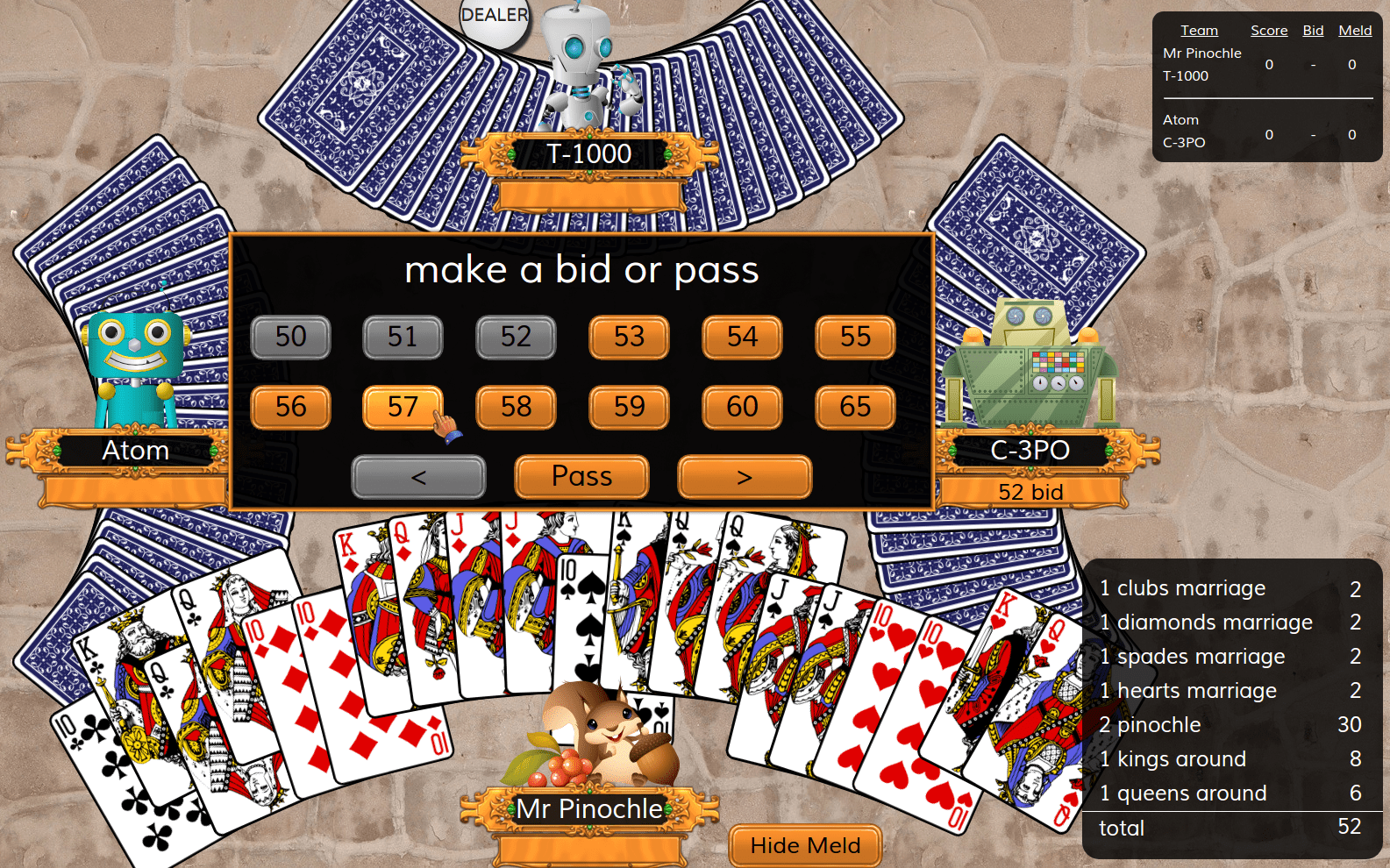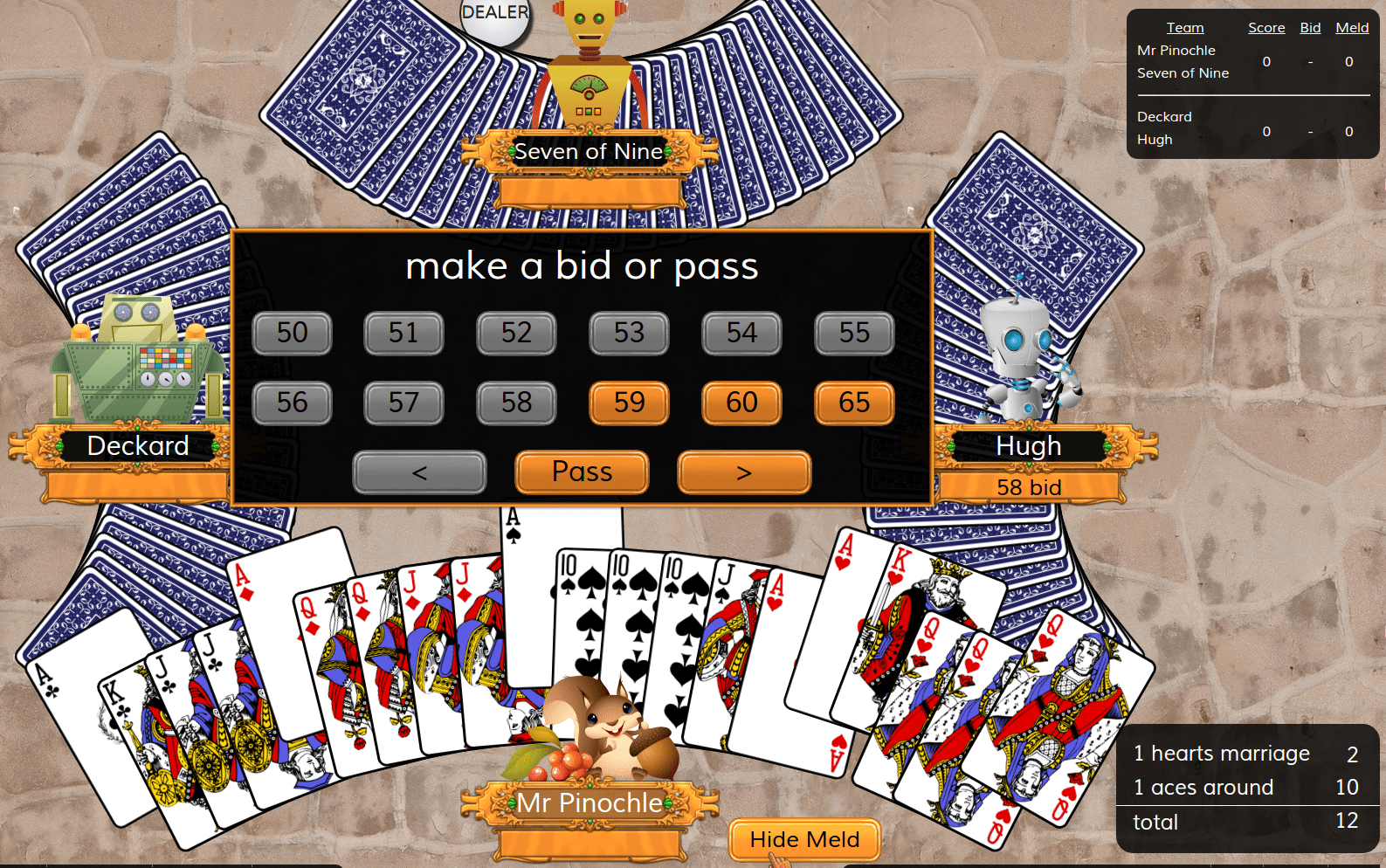Double Deck Pinochle card game strategy and examples
Dive into the world of Double Deck Pinochle with our comprehensive strategy guide, tailored for beginners and seasoned players alike. You'll discover the nuances of meld bidding, ace on ace leadback strategies, and much more. Whether you're new to the game or looking to refine your approach, this page offers insights from a player's perspective, making strategies accessible and actionable.
Ready to put theory into practice? Learn how to play Double Deck Pinochle and play Double Deck Pinochle online today, and embark on your journey to mastering this captivating card game. Let's shuffle up and deal!
Double Deck Pinochle Card Game - Meld Bids
June 6 2017
Table of Contents- Bidding as a Signal
- Captaincy Bid
- Meld Bid in First Seat
- General Rules of Meld Bidding
- Meld Bid in Second Seat
- When is it Impossible to Meld Bid?
- Resources
Bidding as a Signal
If you do not know anything about meld and trump in Pinochle, you will want to review that information before continuing here.
In Double Deck Pinochle, there is a round of bidding immediately after the cards are dealt. As a beginner, your first task is to look at your cards and decide what bid to make. This page is designed to help with that.
Caveat to Spades players: Your bid in Double Deck Pinochle is not the number of tricks that you think you can take.
In Double Deck Pinochle, your bid is used to convey a signal to your partner. It can either be used to tell them about your meld, or about your desire to "make trump" (this is a jargon term - it means you want to choose the trump suit).
Captaincy Bid
A "captaincy bid", also called a take bid, is a bid that tells your partner that you want to choose the trump suit. The simplest such bid is an opening bid of 50; this is the minimum bid you can make without passing altogether. A bid of 50 means "I want to make trump, let me know if you have any meld." (There is an exception - the "save" bid - discussed elsewhere.)
A bid that adds 1 to the previous bid is also usually a captaincy bid. For example, if the previous player bid 55, and you bid 56, then you are saying "I want to make trump."
If your partner has made a captaincy bid before you got to make your own bid, they may still find it useful to know your meld in follow-up bids. It is useful to provide a meld bid to your partner even before they have made a bid.
Your partner may think that they have a good trump suit, but if they are poor in meld, they may be afraid to try to win the bid. The rules of Double Deck Pinochle require that your team have at least 20 meld in order to make trump. If you or your teammate wins the bid, but have 19 meld or less, you will immediately lose 50 points! So giving your partner information about your hand is usually helpful. If on your first bidding opportunity you pass, this also conveys a certain message to your partner: "I have less than 20 meld".
Meld Bid in First Seat
Let's look at an example. You have been dealt a set of cards, and as a beginner you are not sure what meld you have in your hand, so you click the "show meld" button. You have 22 meld. The meld will have been computed without a trump suit, because trump has not been chosen.
You are in "first seat". This is another jargon term. It means you are the person left of the dealer, and hence the first person to bid. What should you bid?
Let's assume that you want to "tell" your partner that you have 20 meld. The way to do this is to add 2 to the current bid. But there is no current bid, so what does this mean? The default minimum bid is 50. So add 2 to 50, and give a "meld bid" of 52. Any player who knows about meld bids will understand that your hand contains about 20 meld. Note: that includes your opponents! You are giving your partner information, but at the cost of revealing information to your opponents as well.
You may have noticed that Mr Pinochle has a "run" in hearts in the screenshot above. He has a card of each rank in that suit: A-10-K-Q-J. If hearts were the trump suit, he would get additional meld due to the run. However, such additional meld should never be added to your meld bid. Only meld that is independent of a trump suit should be used for making a meld bid.
General Rules of Meld Bidding
Are you confused about why you added 2 to the current bid above? It's because you had 20 meld. The rule for giving a meld bid is:
- Divide your hand's meld by 10, and add the result to the current bid.
- Exception #1: do not give a meld bid of +1. It will confuse your partner, as a +1 bid means "I want to make trump" in Pinochle! So if you have only 10 meld, just do not give a meld bid.
- Exception #2: do not give a meld bid if it causes your bid to be 60 or more. Bids higher than 60 are not usually considered to be meld bids, but captaincy bids. There is an exception to this exception - Jump Bids - which is more advanced than our discussion here. If you do have a lot of meld and giving a true meld bid would put the bid at 60 or more, it can still be helpful to bid up to 58, if possible, if it conveys to your partner that you do have some meld points to contribute. For example, suppose the current bid is 54 and you have 90 meld. Adding +9 to the bid would put you at 63, which is not a meld bid. But making a bid of 58 can be used to say "I have a lot of meld."
- Exception #3: a bid of 59 is often considered to mean "I have double aces around". So if you compute a meld bid, and the result is 59, you will probably want to back it down to 58 instead. If you do have double aces around, you should bid 59 to signal it.
Meld Bid in Second Seat
Here is an example where you are "second seat" (second to bid). You have 52 meld - that's a lot of meld!
If your right-hand opponent (C-3PO in the screenshot) had passed, your meld bid would be 55. However, that player bid 52 - and in doing so, revealed that he has about 20 meld. If you want to give a meld bid, you will have to add 5 (52/10) to the previous bid. That means your bid should be 57. Sometimes, in discussions, people will say "your meld bid is +5" in this case. But you should never say this out loud at a Pinochle table! Signalling is never done verbally, with Pinochle.
When is it Impossible to Meld Bid?
In the screenshot below, Mr Pinochle should not give a meld bid. There are a couple of reasons. Can you spot them?
Here are the reasons. First, he does not have at least 20 meld - he only has 12 meld, and adding +1 to the current bid is not a meld bid. Second, if he did have 20 meld, +2 over the current bid would push the maximum bid to 60. Recall Exception #2: do not give a meld bid if it pushes the bidding to 60.Resources
You can read more discussions about bidding here:


